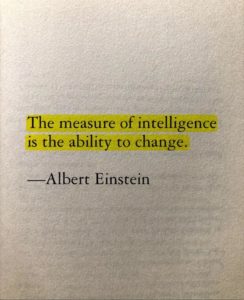The measure of intelligence is the ability to change. – Albert Einstein
Albert Einstein once proclaimed, “The measure of intelligence is the ability to change.” In this profound statement, Einstein encapsulated the essence of intellectual prowess – the capacity not only to comprehend but to adapt in the face of evolving circumstances. This essay delves into the depths of this timeless quote, unraveling the significance of adaptability as the true measure of intelligence.
Understanding Intelligence in a Dynamic World
In the 21st century, the world is characterized by rapid technological advancements, shifting cultural landscapes, and unprecedented global interconnectedness. The measure of intelligence, in such a dynamic context, extends beyond the acquisition of static knowledge. It encompasses the ability to navigate an ever-changing terrain of information, technology, and societal norms.
Einstein’s notion of intelligence aligns with the idea of a growth mindset, where individuals embrace challenges and view failures as opportunities for learning. The adaptive mind is one that thrives in uncertainty, constantly seeking new insights and refining perspectives.
Embracing Change: Personal Growth and Learning
Individual adaptability, a cornerstone of intelligence, is evident in the stories of successful individuals who faced setbacks and used them as stepping stones to success. Oprah Winfrey, for instance, encountered numerous challenges in her career but adapted by leveraging each obstacle as a learning opportunity. Her ability to evolve with the changing media landscape showcases the true measure of her intelligence.
Learning from mistakes becomes a crucial facet of intelligence, as highlighted by the experiences of Thomas Edison. His numerous attempts before successfully inventing the light bulb underscore the intelligence embedded in resilience and a willingness to change course when necessary.
Societal Intelligence: Navigating Change on a Global Scale:
Expanding the scope to societal intelligence, the ability of a community to adapt becomes a collective measure of its intellect. The Renaissance in Europe serves as a historical example of societal intelligence, where a cultural shift propelled the region into a period of unprecedented creativity, innovation, and exploration.
In contemporary times, Silicon Valley exemplifies societal intelligence by embracing technological change and fostering an environment where innovation thrives. The region’s ability to adapt quickly to emerging technologies positions it as a global leader in the tech industry.
Resistance to Change: Challenges and Consequences
The reluctance to change is a ubiquitous challenge. Kodak’s resistance to embracing digital photography serves as a cautionary tale. Despite inventing the first digital camera in 1975, Kodak hesitated to shift its focus from traditional film. This resistance ultimately led to the company’s decline.
At the individual level, the fear of change often stems from the unknown. However, clinging to familiarity can result in missed opportunities for growth and personal development. In contrast, those who willingly step out of their comfort zones often find themselves on a path of continuous learning and intellectual advancement.
Case Studies: Historical and Contemporary Examples
Historical figures provide compelling case studies of intelligence demonstrated through adaptability. Leonardo da Vinci, a polymath of the Renaissance, seamlessly transitioned between various fields, showcasing an unparalleled ability to adapt to diverse intellectual pursuits.
In the contemporary realm, the transformation of Apple Inc. under the leadership of Steve Jobs exemplifies organizational adaptability. Jobs, known for his visionary approach, led Apple through innovative product launches and strategic shifts, solidifying its status as a global technology giant.
Einstein’s timeless quote beckons us to redefine our understanding of intelligence in a dynamic world. It calls for an embrace of change, a recognition that intellectual prowess extends beyond what is known to how well one can navigate the unknown. As we stand on the precipice of an ever-evolving future, the measure of intelligence remains intrinsically linked to the ability to change – an invitation to cultivate minds that not only understand the world but actively shape its trajectory.
